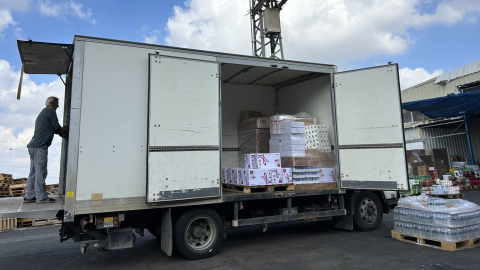Rumors of War: Could Hostilities Between Israel and Iran Break Out in Spring 2012?
Joel C. Rosenberg
Washington, foreign capitals and the media are suddenly abuzz this week with rumors of impending war between Israel and Iran. Senior U.S. and Israeli officials are speaking with rare candor about the growing possibility of Israeli airstrikes against Iran’s nuclear facilities. We’ve known this day was coming. The handwriting has been on the wall for some time. But never have I heard such high-ranking officials speaking in terms of specific timeframes. Consider several perspectives.
The Sunday New York Times magazine this week published a must-read story by Israeli journalist Ronen Bergman, one of the most respected Israeli journalists following the Iran threat over several decades. It is headlined, “Will Israel Attack Iran?” Bergman’s conclusion: “After speaking with many senior Israeli leaders and chiefs of the military and the intelligence, I have come to believe that Israel will indeed strike Iran in 2012. Perhaps in the small and ever-diminishing window that is left, the United States will choose to intervene after all, but here, from the Israeli perspective, there is not much hope for that. Instead there is that peculiar Israeli mixture of fear—rooted in the sense that Israel is dependent on the tacit support of other nations to survive—and tenacity, the fierce conviction, right or wrong, that only the Israelis can ultimately defend themselves.”
According to Bergman, Israeli Prime Minister Netanyahu and Defense Minister Barak “have both repeatedly stressed that a decision has not yet been made and that a deadline for making one has not been set. As we spoke, however, Barak laid out three categories of questions, which he characterized as ‘Israel’s ability to act,’ ‘international legitimacy’ and ‘necessity,’ all of which require affirmative responses before a decision is made to attack.”
- Does Israel have the ability to cause severe damage to Iran’s nuclear sites and bring about a major delay in the Iranian nuclear project? And can the military and the Israeli people withstand the inevitable counterattack?
- Does Israel have overt or tacit support, particularly from America, for carrying out an attack?
- Have all other possibilities for the containment of Iran’s nuclear threat been exhausted, bringing Israel to the point of last resort? If so, is this the last opportunity for an attack?
“For the first time since the Iranian nuclear threat emerged in the mid-1990s,” Bergman wrote, “at least some of Israel’s most powerful leaders believe that the response to all of these questions is yes.”
Now, a Washington Post story published by veteran reporter David Ignatius on February 2nd indicates that senior Obama administration officials fear the war could start as soon as this spring. U.S. Defense Secretary Leon Panetta “believes there is a strong likelihood that Israel will strike Iran in April, May or June—before Iran enters what Israelis described as a ‘zone of immunity’ to commence building a nuclear bomb,” Ignatius reported. “Very soon, the Israelis fear, the Iranians will have stored enough enriched uranium in deep underground facilities to make a weapon—and only the United States could then stop them militarily.”
At Ramstein Air Force Base in Germany on Friday, February 3rd, Panetta refused to back away from the Post report, effectively confirming the story. Since October, the administration has been pressuring Israel not to even consider such strikes. The fact that Panetta is talking openly about an Israeli first strike suggests the White House is deeply worried the epicenter is about to be engulfed in war and are preparing the nation—and the world—for such eventualities.
Is war imminent? I believe the concerns are very valid and that Israeli Prime Minister Netanyahu and Defense Minister Ehud Barak are, in fact, finalizing their war plans and their civil defense preparations. They may not have made a final decision, but they see the U.S. or international community moving too slowly and indecisively, despite the imposition of more economic sanctions in recent weeks. The Israeli leadership fears Iran will have operable nuclear weapons by the end of the year, and even though Iran may not yet be able to attach those to high-speed ballistic missiles—yet being the operative word—they fear a second Holocaust if they don’t act soon.
That said, not everyone is convinced an Israeli-Iranian war will break out in 2012. This week, I had a long lunch with former CIA Director Porter Goss. We discussed the rising tensions in the epicenter, where they might lead, and the Shia End Times theology driving the current regime in Tehran. I asked him specifically, “How do you assess the likelihood of war between Israel and Iran in 2012?”
“The regime in Tehran has already declared they want to push Israel into the sea,” Goss replied. “Most observers agree that present Iranian leadership lacks the capability, but not the intent to destroy Israel. Despite the open hostility and the behind-the-scenes maneuvers being conducted by both sides, I believe it is unlikely open warfare will break out in 2012. I would look for increasing provocation, more intense covert action, extended psychological warfare and heightened international attention about nuclear proliferation.”
Where, then, does this leave us? “You will be hearing of wars and rumors of wars” in the last days, Jesus said in Matthew 24:6. We are certainly seeing an escalation of war rumors in the epicenter. Let us be praying—even fasting—now for the peace of Jerusalem at this critical time. Please pray for our President and government, for Prime Minister Netanyahu and his senior advisors, and for all the leaders of the Middle East for wisdom and discernment. Pray for the believers in the region to be faithful and bold in serving Jesus Christ as war approaches. And please pray for The Joshua Fund team as we seek to be ready and prepared for whatever comes. We are continuing to provide food and other aid to the poor and needy in the Land. We are also stockpiling supplies ahead of whatever war may be coming next. We are also continuing to expand the “pipeline,” as it were–the physical, financial and relational infrastructure necessary to provide enormous amounts of humanitarian aid when needed. This is not easy work, and we are constantly facing serious obstacles. But we believe the Lord has directed us to do this work. He wants Christians all over the world to be able to provide real and practical assistance to Israeli Jews, Palestinians, and others before, during and after the next war, and we are seeking to be faithful to the task. To that end, thanks so much for standing with us in prayer and financial giving. We are facing a dangerous moment, but we are honored to be in this work together.



_28de80_e7ace672befee9c2ea873b4cd5e2d36febb6e00d.png)
